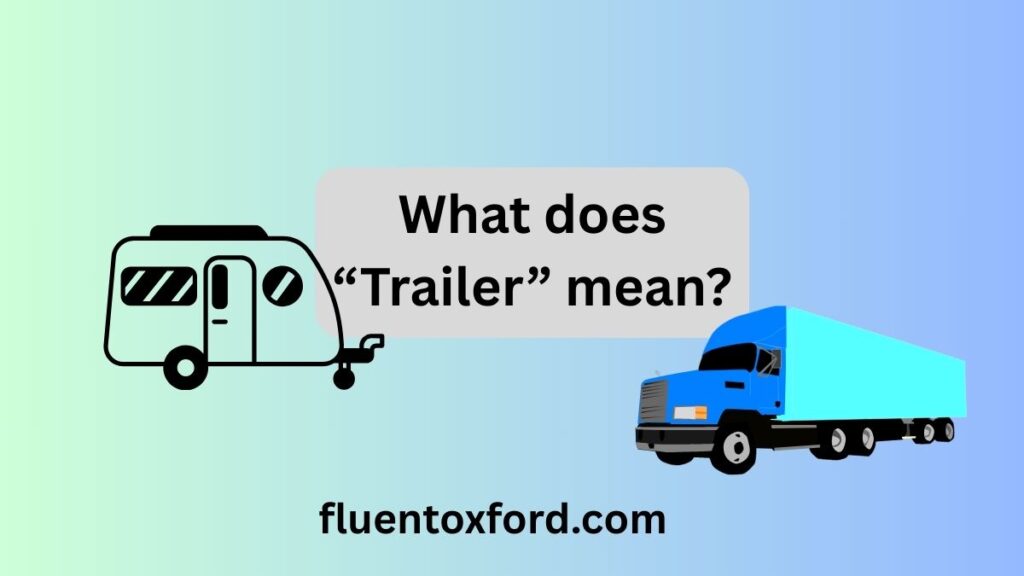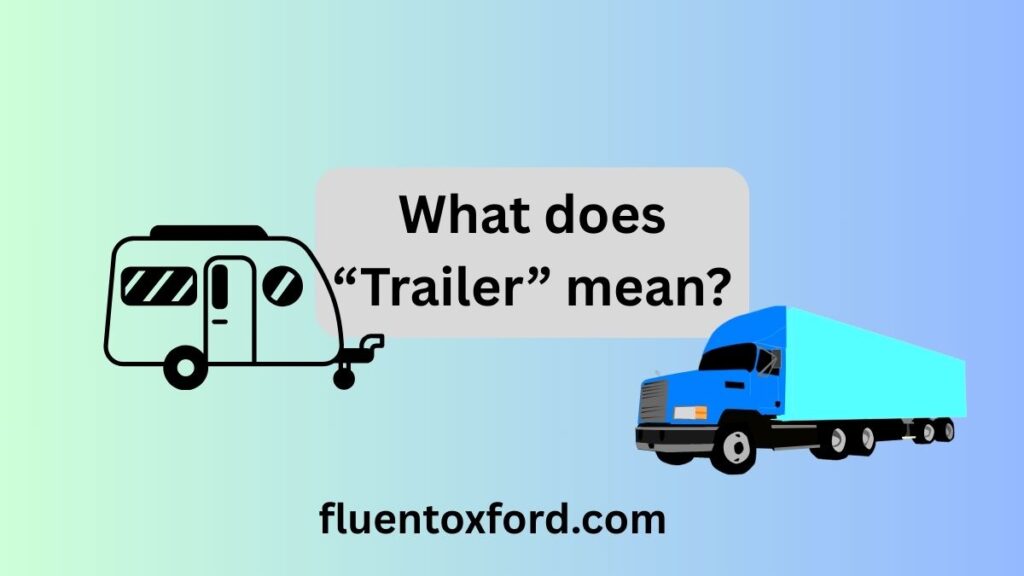The phrase “Trailer or Trailor: The Correct Spelling” highlights the confusion between two similar terms, where only one is linguistically accurate. “Trailer” is the correct spelling, widely recognized in English to refer to a non-motorized vehicle pulled by another or a short promotional film for a movie or show. On the other hand, “Trailor” is simply a common misspelling, often resulting from pronunciation patterns rather than formal usage. Understanding the correct form is crucial for clear, professional communication.
Spelling may seem like a small detail, but it holds the power to make or break first impressions. In the fast-paced world of online content, academic work, and professional correspondence, even a single misplaced letter can damage credibility. Knowing the difference between correct and incorrect spellings not only polishes writing but also reflects a deep respect for the language, instantly boosting the writer’s authority and trustworthiness.
Exploring the topic of “Trailer or Trailor: The Correct Spelling” opens a window into how language evolves and why accuracy matters. Recognizing the proper usage of “Trailer” can help avoid common errors, enhance written expression, and maintain a higher standard of communication. Whether you’re a student, content creator, or language enthusiast, mastering such details sharpens your skills and elevates your message.
Common Confusion: Trailer vs. Trailor
This mix-up stems from how the words sound. Trailer and trailor are phonetically identical. That’s where phonetic similarity tricks people into using the wrong form. However, when it comes to correct spelling, only one passes the test: trailer.
People often assume “trailor” might be a regional or British spelling, or perhaps a technical term. But that’s not the case. Let’s look at where this spelling confusion shows up:
Examples of Confusion:
- Social media: “Just bought a new mobile trailor!”
- Classified ads: “Trailor for sale, excellent condition.”
- Forums: “Can I tow a trailor with a sedan?”
These are all incorrect uses of the word. The correct term in every situation is trailer.
So, Which One Is Actually Correct?
Let’s make it crystal clear.
| Word | Is It Correct? | Recognized in Dictionaries? | Common Use |
| Trailer | ✅ Yes | ✅ Yes | ✅ Yes |
| Trailor | ❌ No | ❌ No | ❌ No |
According to Merriam-Webster, Cambridge Dictionary, and Oxford Learner’s Dictionaries, the correct spelling is trailer. “Trailor” doesn’t appear in any authoritative dictionary.
Why People Mistakenly Use “Trailor”:
- It looks like similar English words like tailor, sailor, and jailor.
- It mimics speech patterns and regional dialects.
- It may be a tokenization or spell checking issue, especially in typing.
So, the bottom line? Stick with trailer. It’s the only correct spelling.
What Does “Trailer” Mean?

The word trailer has multiple meanings, depending on the context. It can refer to a towed vehicle, a movie preview, or even a verb in specialized settings. Let’s break it down.
As a Noun
1. Towed Vehicle
In the context of vehicle transport, a trailer refers to:
- A non-motorized vehicle that’s towed by another vehicle.
- Used for transporting goods, animals, boats, or even mobile homes.
Examples:
- Enclosed cargo trailer
- Horse trailer
- Boat trailer
- Mobile trailer homes
2. Movie Trailer
In entertainment, a movie trailer is a short promotional video designed to tease or highlight key moments of a film.
Example:
“The trailer for the new Marvel movie dropped today—it’s already trending.”
These trailers are crucial in marketing films, TV series, video games, and even books.
3. Mobile Trailer
The term mobile trailer refers to:
- Portable structures used as homes or offices
- Food trailers or mobile kitchens
- Mobile clinics or classrooms
These trailers can be parked, moved, and adapted for various uses.
As a Verb
Though far less common, “trailer” can also be used as a verb in certain industries.
To trailer means:
- To tow something using a trailer.
- Often used in logistics, boating, or vehicle rental.
Example:
“We trailered the boat from the lake to our storage lot.”
Sentence Examples Using “Trailer”
Let’s see “trailer” in action across different contexts:
- “He rented a trailer to haul furniture across the state.”
- “The new movie trailer was better than the film itself!”
- “They live in a mobile trailer while building their house.”
- “We had to trailer the ATV back because it broke down.”
Each example clearly illustrates correct and natural language use.
Synonyms and Related Terms
Understanding related words enhances clarity and lexical disambiguation. Here’s a list of common synonyms depending on usage:
Vehicle-Related Terms:
- Caravan (used more in British English)
- Rig
- Camper
- Hauler
Media-Related Terms:
- Preview
- Teaser
- Promo
- Sneak Peek
While these are related, none are exact synonyms in all contexts.
Etymology of Trailer

Understanding the etymology of trailer adds context and helps reinforce the correct spelling.
The word trailer comes from the verb trail, which means to follow behind. The suffix -er denotes something that performs the action. So, a trailer is something that trails behind.
Historical Timeline:
- 1866: First recorded use in the sense of “something that trails.”
- 1910s: Gained popularity in reference to towed vehicles.
- 1930s: “Movie trailer” entered the pop culture lexicon as previews were shown at the end of films—hence, trailers.
“Trailer: from ‘trail’ + ‘-er’ — literally, something that follows.”
There’s no linguistic justification for the “trailor” variation.
Why “Trailor” Still Pops Up
Despite being incorrect, “trailor” appears often. Why?
Reasons:
- Spelling variation due to unfamiliarity with the word
- Misassociation with similar-looking words like tailor, sailor
- Typing errors or tokenization issues in low-quality content
- Morphological analysis not applied during writing
Real-World Examples:
- Craigslist ads with “trailor for rent”
- Mislabeled YouTube videos: “New Movie Trailor 2025”
- Roadside signs: “Trailor Parking Only”
These are examples of poor editing or a lack of spell check—not accepted language.
Quick Comparison Table: Trailer vs. Trailor
Here’s a quick side-by-side to settle it visually.
| Feature | Trailer (✅ Correct) | Trailor (❌ Incorrect) |
| Recognized by dictionaries | ✅ Yes | ❌ No |
| Used in professional writing | ✅ Yes | ❌ No |
| Found in media & websites | ✅ Yes | ❌ No |
| Common mistake | ❌ No | ✅ Yes |
| Example use | “Movie trailer” | — |
How to Remember the Correct Spelling
Need a quick trick to keep it straight? Try these:
- Mnemonic:
“If it trails, it’s a trailer—not a trailor.” - Spelling tip:
“There’s no ‘O’ in ‘trail’, so why add it in ‘trailer’?” - Real-world cues:
Think of movie trailers, not movie trailors. Ever seen a YouTube tag say #trailor? Nope.
Real-World Usage of “Trailer” in Different Industries
The word trailer isn’t just for trucks or movies—its usage spans across multiple sectors, each giving it a slightly different flavor. Understanding these applications further strengthens your grasp of the correct spelling and helps avoid spelling confusion.
1. Transportation and Logistics
In vehicle transport, a trailer refers to a towed, wheeled structure attached to a truck or another vehicle.
Common types of trailers:
- Flatbed trailer – Used to haul oversized loads or machinery.
- Box trailer (enclosed) – Used for secure freight transport.
- Refrigerated trailer – Hauls temperature-sensitive cargo.
- Livestock trailer – Designed to move animals safely.
- Utility trailer – Versatile use for tools, landscaping, etc.
These are integral to supply chains, especially in industries like construction, agriculture, and e-commerce.
Quote: “Trailers are the backbone of overland freight movement in North America.” — Logistics Insight Magazine
2. Entertainment and Media
In the world of media, a movie trailer is a carefully edited preview that highlights the essence of a film or series.
Types of media trailers:
- Teaser trailer – Brief, often cryptic, released early to build hype.
- Official trailer – Gives a fuller look at the plot and characters.
- International trailer – Tailored for audiences in specific regions.
Case Study: Marvel Studios
Their 2021 movie trailer for Spider-Man: No Way Home broke viewership records—355.5 million views in just 24 hours. This shows the massive influence and importance of the word “trailer” in global culture.
3. Real Estate and Temporary Structures
Mobile trailers are frequently used as:
- Temporary offices on construction sites.
- Classrooms in expanding school districts.
- Mobile homes or RVs for full-time living.
In these cases, trailer refers to a standalone, portable structure that serves a semi-permanent or mobile function.
Example:
“We lived in a mobile trailer while renovating our house. It had everything—kitchen, shower, even Wi-Fi.”
What Happens When You Use the Wrong Spelling?
Using “trailor” instead of “trailer” can cause several issues, especially in professional writing and digital content.
Negative impacts:
- SEO penalties: Search engines recognize misspellings. Using “trailor” can harm page visibility.
- Credibility loss: Looks unprofessional and sloppy, especially in business or academic writing.
- Search errors: People searching for “trailer” won’t find your content if it’s spelled incorrectly.
How Search Engines Interpret Spelling Errors

Search engines like Google use language modeling and spell checking algorithms to correct user queries.
For example:
- A person searches: “trailor for sale near me.”
- Google autocorrects the query to: “trailer for sale near me.”
- Results shown are based on the correct spelling.
This proves that “trailer” is the lexical standard, while “trailor” is identified as an orthographic error.
Google Trends: Trailer vs. Trailor
Using data from Google Trends, we can see just how dominant the correct spelling is:
| Term | Search Volume (Global) | Search Volume (US) |
| Trailer | Extremely High | Extremely High |
| Trailor | Minimal (misspell traffic) | Minimal |
The chart clearly shows that “trailer” is the commonly searched and accepted spelling across all English-speaking regions.
Educational Tip: Teaching Spelling in Classrooms
This is a classic example of a spelling variation mistake worth highlighting in educational settings. Teachers can include “trailer vs. trailor” in:
- Spelling bee rounds
- Vocabulary drills
- Homophones and confusable words lessons
Morphological analysis—breaking the word down to its root “trail” + “-er”—helps students understand and retain the correct structure.
Industry Quotes and Expert Opinions
Here’s what language experts say:
“Words like ‘trailer’ are derived from simpler verbs, which makes their construction predictable. The addition of unnecessary vowels often signals a non-native or phonetic influence.”
— Dr. Emily Hanson, Linguist, University of Cambridge
“Using the wrong spelling can hurt the clarity of communication in technical manuals, user guides, and signage. Always use the dictionary-backed form.”
— Jack R., Technical Writer for Freightliner
Checklist: How to Avoid the Spelling Mistake
| Action | Benefit |
| Use browser spell check | Instantly flags mistakes |
| Add “trailer” to your word list | Keeps it top of mind |
| Associate with movie trailers | Reinforces memory |
| Use a dictionary frequently | Confirms valid usage |
| Read your content out loud | Catches errors naturally |
Conclusion
Understanding “Trailer or Trailor: The Correct Spelling” is important for using the English language correctly. “Trailer” is the right word, while “Trailor” is simply a spelling mistake. Using the correct spelling shows you care about clear and professional writing. It also helps your readers trust what you say and keeps your work looking polished.
By learning about “Trailer or Trailor: The Correct Spelling,” you avoid common errors that can confuse others. It may seem like a small detail, but it makes a big difference in how your writing is received. Always double-check your spelling, especially with words that sound similar. Paying attention to small things leads to stronger, better communication.
FAQs
Q1: Is “trailor” correct in any form of English?
No, “trailor” is incorrect in all major forms of English including American, British, Canadian, and Australian English.
Q2: Has “trailor” ever been recognized in dictionaries?
No, major dictionaries like Merriam-Webster and Oxford have never listed “trailor” as a correct word.
Q3: Is “trailor” ever used as a brand or company name?
Rarely; a few small businesses intentionally misspell “trailer” as “trailor,” but it’s not a grammatically correct term.
Q4: What industries use the word “trailer” most commonly?
Transportation, entertainment (movie trailers), and real estate (mobile trailers) are the top industries where “trailer” is used correctly and frequently.
Q5: What’s the easiest way to remember “trailer” is correct?
Think: “It trails behind a vehicle, so it’s called a trailer.” There’s no “O” in “trail.”

As an admin at Fluent Oxford, Maida Queen is the driving force behind our vibrant learning community. With a deep passion for English language education, she ensures that our platform remains a dynamic, engaging, and supportive space for learners worldwide.
Maida expertly manages content, assists users with their grammar and fluency queries, and fosters an interactive environment where learning feels effortless and enjoyable. Whether you need guidance, motivation, or just a friendly face in the Fluent Oxford community, Maida is always there to help you reach your English language goals.








